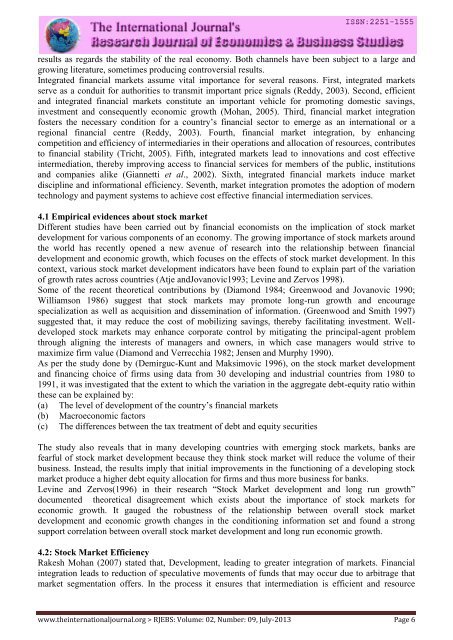Research Journal of Economics & Business Studies - RJEBS - The ...
Research Journal of Economics & Business Studies - RJEBS - The ...
Research Journal of Economics & Business Studies - RJEBS - The ...
You also want an ePaper? Increase the reach of your titles
YUMPU automatically turns print PDFs into web optimized ePapers that Google loves.
esults as regards the stability <strong>of</strong> the real economy. Both channels have been subject to a large and<br />
growing literature, sometimes producing controversial results.<br />
Integrated financial markets assume vital importance for several reasons. First, integrated markets<br />
serve as a conduit for authorities to transmit important price signals (Reddy, 2003). Second, efficient<br />
and integrated financial markets constitute an important vehicle for promoting domestic savings,<br />
investment and consequently economic growth (Mohan, 2005). Third, financial market integration<br />
fosters the necessary condition for a country’s financial sector to emerge as an international or a<br />
regional financial centre (Reddy, 2003). Fourth, financial market integration, by enhancing<br />
competition and efficiency <strong>of</strong> intermediaries in their operations and allocation <strong>of</strong> resources, contributes<br />
to financial stability (Tricht, 2005). Fifth, integrated markets lead to innovations and cost effective<br />
intermediation, thereby improving access to financial services for members <strong>of</strong> the public, institutions<br />
and companies alike (Giannetti et al., 2002). Sixth, integrated financial markets induce market<br />
discipline and informational efficiency. Seventh, market integration promotes the adoption <strong>of</strong> modern<br />
technology and payment systems to achieve cost effective financial intermediation services.<br />
4.1 Empirical evidences about stock market<br />
Different studies have been carried out by financial economists on the implication <strong>of</strong> stock market<br />
development for various components <strong>of</strong> an economy. <strong>The</strong> growing importance <strong>of</strong> stock markets around<br />
the world has recently opened a new avenue <strong>of</strong> research into the relationship between financial<br />
development and economic growth, which focuses on the effects <strong>of</strong> stock market development. In this<br />
context, various stock market development indicators have been found to explain part <strong>of</strong> the variation<br />
<strong>of</strong> growth rates across countries (Atje andJovanovic1993; Levine and Zervos 1998).<br />
Some <strong>of</strong> the recent theoretical contributions by (Diamond 1984; Greenwood and Jovanovic 1990;<br />
Williamson 1986) suggest that stock markets may promote long-run growth and encourage<br />
specialization as well as acquisition and dissemination <strong>of</strong> information. (Greenwood and Smith 1997)<br />
suggested that, it may reduce the cost <strong>of</strong> mobilizing savings, thereby facilitating investment. Welldeveloped<br />
stock markets may enhance corporate control by mitigating the principal-agent problem<br />
through aligning the interests <strong>of</strong> managers and owners, in which case managers would strive to<br />
maximize firm value (Diamond and Verrecchia 1982; Jensen and Murphy 1990).<br />
As per the study done by (Demirguc-Kunt and Maksimovic 1996), on the stock market development<br />
and financing choice <strong>of</strong> firms using data from 30 developing and industrial countries from 1980 to<br />
1991, it was investigated that the extent to which the variation in the aggregate debt-equity ratio within<br />
these can be explained by:<br />
(a) <strong>The</strong> level <strong>of</strong> development <strong>of</strong> the country’s financial markets<br />
(b) Macroeconomic factors<br />
(c) <strong>The</strong> differences between the tax treatment <strong>of</strong> debt and equity securities<br />
<strong>The</strong> study also reveals that in many developing countries with emerging stock markets, banks are<br />
fearful <strong>of</strong> stock market development because they think stock market will reduce the volume <strong>of</strong> their<br />
business. Instead, the results imply that initial improvements in the functioning <strong>of</strong> a developing stock<br />
market produce a higher debt equity allocation for firms and thus more business for banks.<br />
Levine and Zervos(1996) in their research “Stock Market development and long run growth”<br />
documented theoretical disagreement which exists about the importance <strong>of</strong> stock markets for<br />
economic growth. It gauged the robustness <strong>of</strong> the relationship between overall stock market<br />
development and economic growth changes in the conditioning information set and found a strong<br />
support correlation between overall stock market development and long run economic growth.<br />
4.2: Stock Market Efficiency<br />
Rakesh Mohan (2007) stated that, Development, leading to greater integration <strong>of</strong> markets. Financial<br />
integration leads to reduction <strong>of</strong> speculative movements <strong>of</strong> funds that may occur due to arbitrage that<br />
market segmentation <strong>of</strong>fers. In the process it ensures that intermediation is efficient and resource<br />
www.theinternationaljournal.org > <strong>RJEBS</strong>: Volume: 02, Number: 09, July-2013 Page 6
















